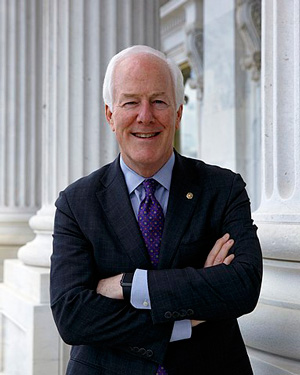February 11, 2024 – WASHINGTON – U.S. Senators John Cornyn (R-TX), Sheldon Whitehouse (D-RI), Thom Tillis (R-NC), Amy Klobuchar  (D-MN), Bill Cassidy (R-LA), and Maggie Hassan (D-NH) last week introduced the Supporting Treatment and Recovery Over Narcotics for Growth, Empowerment, and Rehabilitation (STRONGER) Act, which would help reduce recidivism and break the cycle of addiction by updating and reauthorizing the Residential Substance Abuse Treatment for State Prisoners (RSAT) program that provides treatment and recovery resources to incarcerated individuals with substance use disorders:
(D-MN), Bill Cassidy (R-LA), and Maggie Hassan (D-NH) last week introduced the Supporting Treatment and Recovery Over Narcotics for Growth, Empowerment, and Rehabilitation (STRONGER) Act, which would help reduce recidivism and break the cycle of addiction by updating and reauthorizing the Residential Substance Abuse Treatment for State Prisoners (RSAT) program that provides treatment and recovery resources to incarcerated individuals with substance use disorders:
Senator John Cornyn (R-TX)
“Treatment programs can help incarcerated individuals struggling with substance abuse build better lives while in prison and continue their recovery after they are released,” said Sen. Cornyn. “This bipartisan legislation will ensure the RSAT program can continue to improve lives and reduce recidivism rates across the country.”
“The addiction epidemic cycles people in and out of the justice system. States like Rhode Island have shown that we can break this cycle by making safe and reliable substance use treatments, including medication-assisted treatment, available in jails and prisons,” said Sen. Whitehouse. “I’m pleased to partner with Senator Cornyn on this bipartisan legislation to expand access to treatment and recovery options that help reduce recidivism and end the cycle of addiction.”
“This life-saving legislation will expand access to the necessary resources and tools to more effectively address substance use disorders among incarcerated individuals,” said Sen. Tillis. “By expanding treatment options, developing new training requirements for staff, and allowing those struggling with substance use to seek evidence-based treatment, this legislation will save lives and prepare individuals for reintegration into their community.”
“Expanding access to treatment is a safe and effective way to fight substance use disorders in our correctional facilities,” said Sen. Klobuchar. “This bipartisan bill with Senator Cornyn will reauthorize the RSAT program to provide incarcerated individuals with a path to recovery and rehabilitation.”
“We should encourage our prisons to create a path for inmates to rebuild their lives free of addiction,” said Dr. Cassidy. “By starting the road to recovery while incarcerated and continuing it afterward, we are giving these Americans a second chance for a new life.”
“Addiction can be a major factor in why people released from jail reoffend and end up incarcerated again,” said Sen. Hassan. “Strengthening evidence-based addiction treatment in jails and prisons is an important way to help people enter and stay in recovery – and strengthens long-term public safety in our communities. I urge my colleagues to support this bipartisan legislation.”
Background:
Established under the Violent Crime Control and Law Enforcement Act of 1994, the Residential Substance Abuse Treatment for State Prisoners (RSAT) program provides grants to every state and U.S. territory, and through them, to state prisons and local jails to provide substance use disorder treatment programs to individuals under their supervision. These grants also provide community-based aftercare and post-release treatment that can include medication-assisted treatment, cognitive behavioral therapy and employment, transitional housing, and mental health services.
The Supporting Treatment and Recovery Over Narcotics for Growth, Empowerment, and Rehabilitation (STRONGER) Act would reauthorize RSAT funding for Fiscal Years 2025-2029 and provide critical updates to the program, including:
- Allowing grantees to use RSAT funds to offer treatment to individuals pretrial;
- Strengthening the requirements that all treatment services adhere to established clinical standards;
- Ensuring programs are affiliated with providers who can ensure continuity of care and access to medications after release to reduce the risk of relapse and overdose deaths;
- Requiring program staff to be trained on the science of addiction, strategies for continuity of care during and after incarceration, and evidence-based behavioral therapies used to treat substance use disorder;
- Building capacity, where available and appropriate, including assisting prisons and jails to meet contemporary standards of medical care for substance use disorders;
- And allowing grantees to use funds to obtain training in best practices for treating substance use disorders. The bill does not include any unfunded mandates for training or otherwise.
The legislation is supported by Addiction Policy Forum, All Rise, American Association for the Treatment of Opioid Dependence, American Correctional Association, American Foundation for Suicide Prevention, American Jail Association, American Probation and Parole Association, American Psychological Association, Association of Prosecuting Attorneys, Association of State Criminal Investigative Agencies, Behavioral Health Foundation, Civil Citation Deflection and Diversion Network, Community Anti-Drug Coalitions of America, Community Oriented Correctional Health Services, Correctional Leaders Association, Council of State Governments Justice Center, International Community Justice Association, Jesuit Conference of Canada and the United States, Major Cities Chiefs Association, Major County Sheriffs of America, Meadows Mental Health Policy Institute, Mental Health America, NAADAC, the Association for Addiction Professionals, National Alliance on Mental Illness, National Association for Behavioral Healthcare, National Association of Counties, National Association of Police Organizations, National Association of Social Workers, National Association of State Alcohol and Drug Abuse Directors, National Association of State Mental Health Program Directors, National Conference of State Legislatures, National Council for Mental Wellbeing, National Criminal Justice Association, National District Attorneys Association, National League of Cities, National Narcotic Officers’ Associations’ Coalition, National Sheriffs’ Association, Police, Treatment, and Community Collaborative, Treatment Alternatives for Safe Communities (TASC), Inc., Treatment Communities of America, and the United States Conference of Mayors.
Source: Senator John Cornyn
This post was originally published on this site be sure to check out more of their content.








